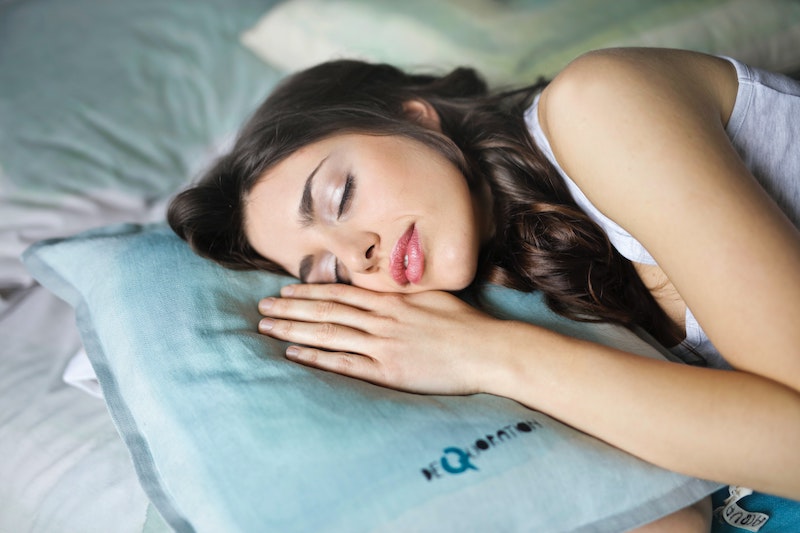How to get a good night’s sleep
November 14, 2020
We all know we need sleep to function mentally the next day, but did you know sleep also regulates a multitude of biological systems including cardiovascular, immune, nervous and endocrine? In fact, repeated poor sleep quality has major impacts on blood sugar, hormones and reproductive function; scientists now know for every hour under 7 hours sleep the risk of cardiovascular disease and diabetes increases by 7% and 9%, respectively, and in patients with poor quality sleep the risk of obesity increased by 45% and Alzheimer’s disease by a massive 55%.
Something I’m hearing a lot at the moment is how much everyone is struggling sleeping, and it’s hardly surprising given the extra stress we’re all feeling this year (and possibly moving a little less in the days if you’ve started working from home). But there are a few things you can do to improve your sleep.
To help you fall asleep
Establish a relaxing pre-sleep routine
Ease the transition from wake time to sleep time with a period of relaxing activities an hour or so before bed. Try to do this every night, as a regular nightly routine helps the body recognize that it is bedtime. This is the most important point – absolutely no screens (TV, computer, phone or tablet) in the hour before bed, minimum. Our ability to control the light in our environment has seen a 2 hour per night decrease in the average person’s sleep over the last 50 years, and screen time is the main factor impacting people’s sleep these days. Instead try some yin yoga.
Make sure that the sleep environment is conducive to sleep
Reduce disruptive disturbances from outside with earplugs, noise-cancelling headphones, heavy curtains or an eye mask. The bedroom should be cool – between 16 and 20 degrees for optimal sleep. Also keep the room well ventilated. Avoid using your phone as an alarm clock. Choose an old-fashioned clock with a non-illuminated dial. If you keep your phone next to your bed position it face-down and on silent.
Keep your internal clock set with a consistent sleep schedule
Going to bed and waking up at the same time each day sets the body’s “internal clock” to expect sleep at a certain time night after night. Try to stick as closely as possible to your routine on weekends to avoid a Monday morning sleep hangover (“social jetlag”).
Avoid stimulants
Avoid caffeine and nicotine four to six hours before bedtime. Don’t forget this includes tea, chocolate and cola, so if you’re struggling to fall asleep maybe rethink that dark chocolate you’re having after dinner or the tea at 3pm. Ideally avoid caffeine from 12pm onwards – some people have a genetic variation in the enzymes that break caffeine down and it can stay in their system for 12 hours, so make sure you’re giving your body plenty of time to remove it.
To improve your sleep quality
Drink alcohol in moderation
While alcohol is well-known to help you fall asleep faster, it decreases the quality of sleep. Limit alcohol consumption to less than one to two drinks per day.
Steer clear of food that can be disruptive right before sleep
Heavy or rich foods, fatty or fried meals, spicy dishes, citrus and carbonated drinks can trigger indigestion for some people. High fat food also delays stomach emptying which can cause bloating. Aim to finish dinner two to three hours before bedtime and avoid foods that cause indigestion.
Aim to be asleep between 10 and 11pm
An hour of sleep before midnight is worth two after because your body needs to be asleep at this time to enter the deep sleep cycle, which is when it undergoes restoration and healing and makes many of its hormones.
Exercise to promote good quality sleep
As little as 10 minutes of aerobic exercise, such as walking or cycling, has been shown to increase the amount of time spent in the stages of slow wave and rapid eye movement sleep, drastically improving sleep quality. For the best night’s sleep, avoid strenuous workouts close to bedtime. Try to finish exercising at least three hours before bed or work out earlier in the day: the best option to support your circadian rhythm is exercising outdoors in exposed light as soon as you wake up.
Balance fluid intake
Drink enough fluid throughout the day to keep from waking up thirsty, but not so much and so close to bedtime that you will be awakened by the need for a trip to the bathroom.
Ensure adequate exposure to natural light
Exposure to sunlight during the day, as well as darkness at night, helps to maintain a healthy sleep-wake cycle. Let in the light first thing in the morning and get out for a sun break during the day- try and get a total of at least 60 minutes a day of exposure to daylight.
Follow Through
Some of these tips will be easier to include in your daily and nightly routine than others. However, if you stick with them, your chances of achieving restful sleep will greatly improve.
If you’re still struggling with sleep, Naturopaths use a range of herbs and nutrients which have been proven to support optimal sleep; you can book in to see Alexandra at The Body Project to help improve you sleep quality.


 hoto by JESHOOTS.COM on Unsplash
hoto by JESHOOTS.COM on Unsplash